中考英语易错词辨析
初中英语中考易混词汇辨析(精选9组)

初中英语易混词汇辨析一、how much和how manyhow much和how many:how much用来询问事物的数量,后接不可数名词;how many用来询问事物的数量,后接可数名词复数。
1.所修饰词不同how much用来修饰不可数名词,表示数量,也可单独使用。
how many用来修饰可数名词的复数,它的句式是:How many+复数名词+一般疑问句+?[例句]How much milk is there in the glass?玻璃杯里有多少牛奶?How many books are there on the desk?有多少本书在桌子上?2.用法不同How much 表示多少钱,用来问价格。
[例句]How much is this dress?这个连衣裙多少钱?How many 表示多少,用来问数量。
[例句]How many apples do you have?你有多少苹果?二、in和on当我们表示某些东西被其他东西所包围时使用“in”这个词。
而“on”用于描述物体被放置在其他物体上方或外部的情况。
in可表时间,表地点,表手段、方法、材料。
on表示时间、地点、方位等。
1.意思不同in:prep.在 ... 里;在 ... 地方;在 ... 期间on:prep.在 ... 之上2.用法不同in:in着重一段时间的过程,常用于重复动作或延续动作。
in表示从现在时间算起推移到将来的一段时间之后,一般与将来时态连用。
[例句]He is a layman in economics.他对经济学一窍不通。
on:表示“在物体的表面上”,只能用on的表达方式有on the next morning,on the following。
[例句]The spider is walking on the ceiling.蜘蛛在天花板上爬行。
3.侧重点不同in:表示“在其中”。
on:表示“在表面”。
三、if和whetherif和whether:if和whether在宾语从句中,都表“是否”,可换用,if更口语化,whether 正式些。
英语中考牢记20组易混易错词语辨析
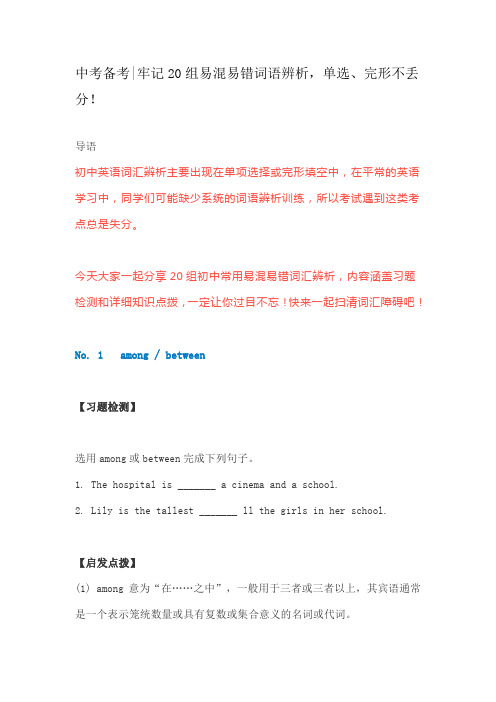
中考备考|牢记20组易混易错词语辨析,单选、完形不丢分!导语初中英语词汇辨析主要出现在单项选择或完形填空中,在平常的英语学习中,同学们可能缺少系统的词语辨析训练,所以考试遇到这类考点总是失分。
今天大家一起分享20组初中常用易混易错词汇辨析,内容涵盖习题检测和详细知识点拨,一定让你过目不忘!快来一起扫清词汇障碍吧!No. 1 among / between【习题检测】选用among或between完成下列句子。
1. The hospital is _______ a cinema and a school.2. Lily is the tallest _______ ll the girls in her school.【启发点拨】(1) among意为“在……之中”,一般用于三者或三者以上,其宾语通常是一个表示笼统数量或具有复数或集合意义的名词或代词。
(2) between一般指两者之间,其宾语通常是表示两者概念的名词或代词,或由and连接的两个具体的人或物。
between有时也可表示多者之中的“两两之间”。
如:Switzerland lies between France, Germany, Austria and Italy.Key:1. between2. amongNo. 2 lay / lie【习题检测】用lay或lie的适当形式完成句子。
1. I _______ the table when my mother cooked the meal.2. John was ill and _______ in bed all morning.【启发点拨】(1) lay作动词,可意为“摆放(餐桌)”,其过去式与过去分词均为laid,现在分词为laying,常用于短语lay the table,意为“摆放餐桌”。
如:Tom was laying the table.(2) lie作动词,意为“躺;平躺”时,过去式为lay,过去分词为lain,现在分词为lying。
(完整版)中考英语易混词汇辨析
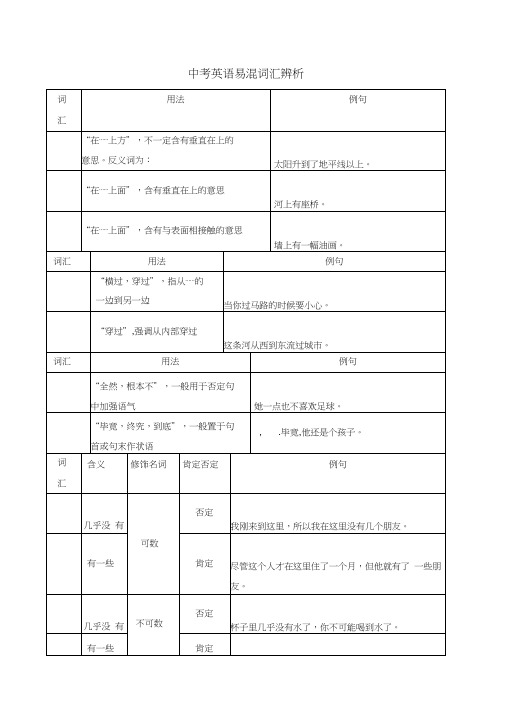
中考英语易混词汇辨析
一种状态的变化,后接形容词或名词他成为了一名医生。
词汇用法例句
表动作,指“去睡觉”
我经常很晚才去睡觉。
也表动作,指进入“睡着”状态
他发现很难入睡。
表动作,意为“刚刚入睡”,指“刚
睡着”的动作
.他刚睡着,这时有人大声敲门。
表状态,意为“睡着的”
这孩子睡着一个小时了。
词汇含义用法例句
发生常指具体事件的发生,特别指那些
偶然的或不能预见的“发生”
?
这事故是怎样发生的?
通常指“(某事)按计划进行或按计划
发生”,此外还有“举行”之意解放以后,发生了巨大变化。
例句
词汇用法
表示“曾经到过某处”,但目前人
不在那儿
? 你到哪儿去了?
表示“去了”,指人已经走了(至少
目前不在说话的地点,在去的途中
或已经到达目的地)
她不在这儿。
她去南京了。
表示“去了某地,并曾在那儿(一段
时间),或现在仍在那儿”她在上海待了几个周了。
词汇用法一言辨义“听到”,强调听的结果,不一定是有意识
的
“听”,强调听的动作,当然未必能听到什
么。
是不及物动词,接宾语时要加
我们仔细地听了半天,但什么也没听到。
词汇用法例句。
中考英语语法易错易混知识点

中考英语语法易错易混知识点一、可数名词与不可数名词1.可数名词表示能够用数目表示的名词,常常可以用单数或复数形式来表示,其前可以加"a"或"an"。
例句:I have a book.(单数)/ I have two books.(复数)2.不可数名词表示不能用数目清楚地表示的名词,只能用单数形式,前面不能加"a"或"an"。
例句:I have some milk.(不可数名词)二、形容词与副词1.形容词修饰名词,用来描述或限定名词。
形容词通常放在名词的前面。
例句:She is a beautiful girl.2.副词用来修饰动词、形容词或其他副词,通常放在被修饰词的后面。
例句:He runs fast.三、一般现在时与现在进行时1.一般现在时表示经常性或习惯性的动作,叙述真理或客观事实。
例句:The sun rises in the east.(真理)/ He often plays soccer on weekends.(习惯性动作)2.现在进行时表示现在正在进行的动作。
例句:I am watching TV now.(正在进行的动作)四、一般过去时与过去进行时1.一般过去时表示已经结束的过去的动作。
例句:I finished my homework yesterday.(过去的动作已经完成)2.过去进行时表示过去其中一时刻正在进行的动作。
例句:They were playing basketball at 7 o'clock yesterday evening.(过去其中一时刻正在进行的动作)五、定冠词与不定冠词1.定冠词"the"用来特指已经提到过或可唯一确定的名词。
例句:I saw the boy in the park.(特指已经提到的男孩)2.不定冠词"a"或"an"用来表示泛指或不特指的名词。
初中英语易错词汇

初中英语易错词汇1.affect 和effect:常被误用。
affect是动词,意为“影响”;effect是名词,意为“效果”或“影响”。
2.advice 和advise:advice是名词,意为“建议”;advise是动词,意为“建议”。
3.between 和among:between用于两者之间,among用于三者或三者以上之间。
4.borrow 和lend:borrow意为“借入”,lend意为“借出”。
5.bring 和take:bring意为“带来”,take意为“带走”。
6.can 和may:can表示能力或可能性,may表示许可或可能。
7.few 和little:few修饰可数名词,little修饰不可数名词。
8.healthy 和healthily:healthy是形容词,healthily是副词。
9.its 和it's:its是形容词性物主代词,it's是it is的缩写。
10.know 和knew:know是现在时,knew是过去时。
11.lie 和lay:lie是不及物动词,意为“躺”;lay是及物动词,意为“放置”。
12.lose 和miss:lose意为“丢失”,miss意为“想念”或“错过”。
13.noise 和voice:noise是噪音,voice是人的声音。
14.pass 和past:pass是动词,past是介词或副词。
15.problem 和question:problem指需要解决的问题,question指问题或疑问。
16.quiet 和quite:quiet是形容词,意为“安静的”;quite是副词,意为“非常”。
17.receive 和accept:receive指收到,accept指接受。
18.say 和speak:say强调说话内容,speak强调说话动作。
19.since 和for:since与时间点连用,for与时间段连用。
20.some time 和sometime:some time表示一段时间,sometime表示某个时候。
初三英语词汇辨析常见错误

初三英语词汇辨析常见错误在初三英语的学习中,词汇辨析是一个重要的部分,但同学们在这方面常常会出现一些错误。
以下是一些常见的错误类型及分析。
一、混淆近义词很多同学容易将意思相近的单词用错,比如“alone”和“lonely”。
“alone”侧重于“独自一人”,表示客观上的状态;而“lonely”则侧重于“孤独的、寂寞的”,更多地表达一种主观感受。
例如:He was alone in the room(他独自一人在房间里。
)He feels lonely because he has no friends (他感到孤独,因为他没有朋友。
)再比如“take”“bring”和“fetch”。
“take”表示“带走、拿走”,是把某物从说话者所在的地方带到别的地方;“bring”表示“带来、拿来”,是把某物从别的地方带到说话者所在的地方;“fetch”则表示“去取来、去拿来”,强调一个往返的动作。
例如:Take this book to the library(把这本书带到图书馆去。
)Bring me a cup of coffee(给我拿一杯咖啡来。
)Please fetch my bag from the classroom(请从教室把我的包拿来。
)二、忽略词汇的词性有些单词虽然拼写相同,但词性不同,意思和用法也不同。
比如“interest”这个词,既可以作名词,表示“兴趣”,也可以作动词,表示“使感兴趣”。
例如:My interest is reading(名词,我的兴趣是阅读。
)This book interests me(动词,这本书使我感兴趣。
)再如“success”是名词,“succeed”是动词,“successful”是形容词。
我们要说“He succeeded in the exam”(他考试成功了。
)而不能说“He successed in the exam”三、误解短语动词的含义短语动词也是同学们容易出错的地方。
中考20组必考英语易混词辨析

初中必考20组必考英语易混词辨析——易混词辨析——1、accomplish vs. achieveaccomplish (v.): 完成某项任务。
例子: She accomplished her homework. (她完成了作业。
)achieve (v.): 实现目标。
例子: He achieved his goal. (他实现了他的目标。
)2、advice vs. adviseadvice (n.): 建议。
例子: I need your advice. (我需要你的建议。
)advise (v.): 提供建议。
例子: I advise you to study. (我建议你学习。
)3、allow vs. permitallow (v.): 允许,通常口语化。
例子: My parents allow me to go out. (我的父母允许我出去。
)permit (v.): 允许,通常正式。
例子: The school permits it. (学校允许这样做。
)4、bored vs. boringbored (adj.): 感到无聊的。
例子: I feel bored in class. (我在课堂上感到无聊。
)boring (adj.): 令人无聊的。
例子: The movie was boring. (这部电影很无聊。
)5、careful vs. cautiouscareful (adj.): 小心的。
例子: Be careful with that glass. (小心那只玻璃杯。
)cautious(adj.): 小心翼翼的,避免风险。
例子: He is cautious with money. (他在处理钱时很小心。
)6、common vs. ordinarycommon (adj.): 普遍的。
例子: It is common to use phones. (使用手机是很常见的。
中考常考易错词组辨析
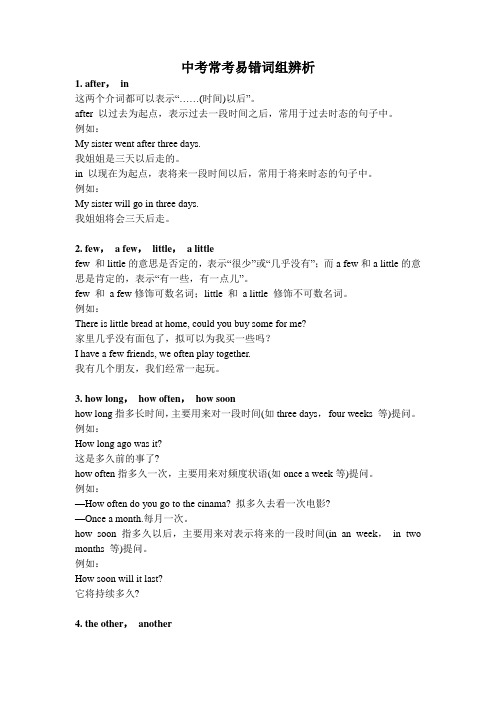
中考常考易错词组辨析1. after,in这两个介词都可以表示“……(时间)以后”。
after 以过去为起点,表示过去一段时间之后,常用于过去时态的句子中。
例如:My sister went after three days.我姐姐是三天以后走的。
in 以现在为起点,表将来一段时间以后,常用于将来时态的句子中。
例如:My sister will go in three days.我姐姐将会三天后走。
2. few,a few,little,a littlefew 和little的意思是否定的,表示“很少”或“几乎没有”;而a few和a little的意思是肯定的,表示“有一些,有一点儿”。
few 和a few修饰可数名词;little 和a little 修饰不可数名词。
例如:There is little bread at home, could you buy some for me?家里几乎没有面包了,拟可以为我买一些吗?I have a few friends, we often play together.我有几个朋友,我们经常一起玩。
3. how long,how often,how soonhow long指多长时间,主要用来对一段时间(如three days,four weeks 等)提问。
例如:How long ago was it?这是多久前的事了?how often指多久一次,主要用来对频度状语(如once a week等)提问。
例如:—How often do you go to the cinama? 拟多久去看一次电影?—Once a month.每月一次。
how soon指多久以后,主要用来对表示将来的一段时间(in an week,in two months 等)提问。
例如:How soon will it last?它将持续多久?4. the other,anotherthe other 指两者中的“另一个”,表示特指,可接单数名词,也可单独使用。
中考英语易错知识点

中考英语易错知识点1.词类转换:容易混淆的词类有名词、动词、形容词和副词。
例如:admire(动词, 喜欢)和admirable(形容词,令人赞美的);heart(名词, 心)和heartily(副词, 真诚地)2.词义辨析:容易混淆的词有homework(家庭作业)和housework(家务活);advertisement(广告)和announcement(公告)。
要注意理解上下文。
3.同音异义词:英语中有很多同音异义词,容易混淆。
例如:mail(邮件)和male(男性);know(知道)和no(不)4.时态混淆:英语中时态比较多,常混淆的有三种:一般现在时与一般过去时、现在进行时与一般现在时、过去进行时和一般过去时。
要记住各种时态的用法和时间。
5.代词混淆:英语中代词的使用很灵活,容易混淆。
要记住各种代词的用法和语境。
例如:I和me、we和us、he和him、they和them等。
6.连词混淆:英语中连词比较多,容易混淆,如:but/and/or;because/so;although/while等。
要根据语境和句子的连贯性选择正确的连词。
7.误用不定冠词:不定冠词a/an容易误用,要注意名词的发音和拼写。
当单词的发音是元音时,用an, 否则用a。
例如:an hour, a hotel.8.固定短语和惯用语:英语中有很多固定短语和惯用语,要注意词组的固定用法。
例如:look forward to, take care of,9.介词和动词搭配:介词和动词搭配要严格接合,不能随意搭配。
例如:listen to, think of。
10.拼写错误:拼写错误会影响阅读理解和写作,要注意单词的拼写及大小写。
总之,学生在备考中考英语时,应该掌握好以上易错知识点。
在日常学习中,要注重练习,多读多写,多听英语,多思考,才能真正掌握好英语。
中考英语易混词汇辨析
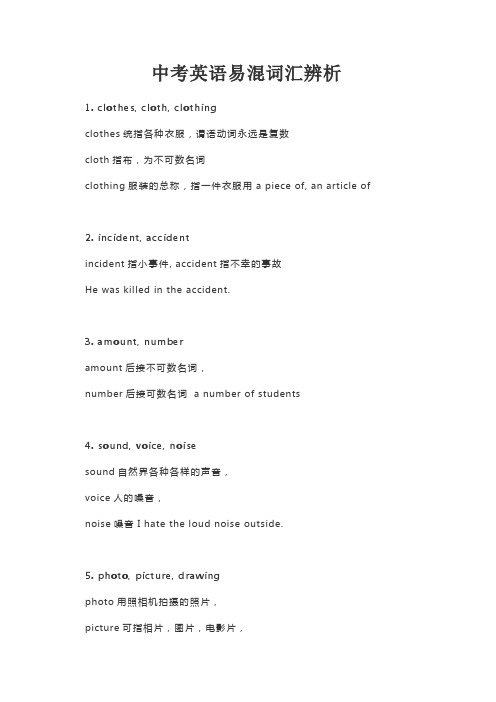
中考英语易混词汇辨析1. clothes, cloth, clothingclothes统指各种衣服,谓语动词永远是复数cloth指布,为不可数名词clothing服装的总称,指一件衣服用a piece of, an article of2. incident, accidentincident指小事件, accident指不幸的事故He was killed in the accident.3. amount, numberamount后接不可数名词,number后接可数名词 a number of students4. sound, voice, noisesound自然界各种各样的声音,voice人的嗓音,noise噪音I hate the loud noise outside.5. photo, picture, drawingphoto用照相机拍摄的照片,picture可指相片,图片,电影片,drawing画的画Let's go and see a good picture.6. weather, climateweather一天内具体的天气状况,climate长期的气候状况The climate here is not good for you.7. road, street, path, wayroad具体的公路,马路,street街道,path小路,小径,way道路,途径take this road; in the street, show me the way to the museum.8. course, subjectcourse课程(可包括多门科目),subject科目(具体的学科)a summer course9. custom, habitcustom传统风俗,习俗,也可指生活习惯,后接to do,habit生活习惯,习惯成自然,后接of doing.I've got the habit of drinking a lot.10. cause, reasoncause指造成某一事实或现象的直接原因,后接of sth./doing sth,reason用来解释某种现象或结果的理由,后接for sth./doing sth. the reason for being late11. exercise, exercises, practiceexercise运动,锻炼(不可数),exercises练习(可数),practice(反复做的)练习Practice makes perfect.12. class, lesson作"课"解时,两者可以替换.指课文用lesson.指班级或全体学生用class. lesson 6; class 513. speech, talk, lecturespeech指在公共场所所做的经过准备的较正式的演说,talk日常生活中的一般的谈话,讲话,lecture学术性的演讲,讲课 a series of lecture on…14. work, job二者均指工作。
中考英语易错考点---词义辨析
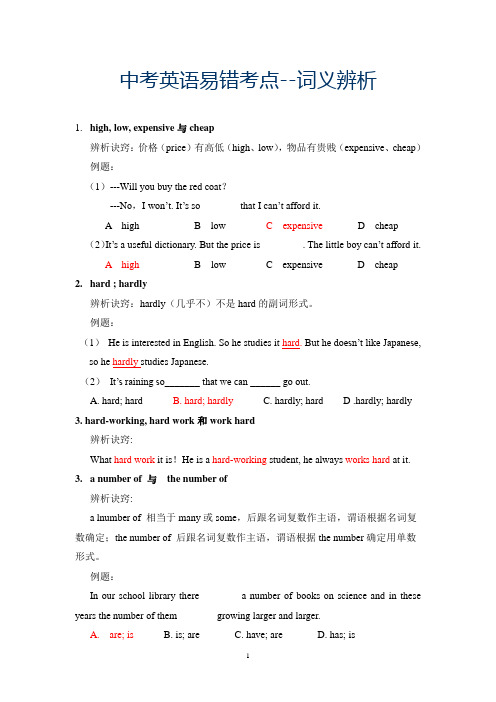
中考英语易错考点--词义辨析1.high, low, expensive与cheap辨析诀窍:价格(price)有高低(high、low),物品有贵贱(expensive、cheap)例题:(1)---Will you buy the red coat?---No,I won’t. It’s so _______ that I can’t afford it.A highB lowC expensiveD cheap (2)It’s a useful dictionary. But the price is ________. The little boy can’t afford it.A highB lowC expensiveD cheap2.hard ; hardly辨析诀窍:hardly(几乎不)不是hard的副词形式。
例题:(1)He is interested in English. So he studies it hard.But he doesn’t like Japanese, so he hardly studies Japanese.(2)It’s raining so_______ that we can ______ go out.A. hard; hardB. hard; hardlyC. hardly; hard D .hardly; hardly3. hard-working, hard work和work hard辨析诀窍:What hard work it is!He is a hard-working student, he always works hard at it. 3. a number of 与the number of辨析诀窍:a lnumber of 相当于many或some,后跟名词复数作主语,谓语根据名词复数确定;the number of 后跟名词复数作主语,谓语根据the number确定用单数形式。
中考英语常考易错知识点

中考英语常考易错知识点
一、词汇
1. 同义词和近义词的辨析:例如,ask和question,happy和glad 等。
2. 多义词的辨析:例如,bank可以指银行,也可以指河岸等。
3. 固定词组和短语的认识和应用:例如,take care of,look forward to等。
4. 词性转换:例如,able(形容词)和ability(名词)等。
二、语法
1.一般现在时和现在进行时的区别:一般现在时表示经常性的动作或
状态,而现在进行时表示正在进行的动作。
2. 直接引语和间接引语的转换:例如,He said, "I am happy."可
以转换为He said that he was happy.
3. 不定代词的用法:例如,someone,anyone等。
4. 名词和动词的数的一致:例如,the number of和a number of
的区别。
三、阅读
1.内容理解:学生需要仔细读懂文章中的关键信息,了解故事情节和
人物的特点。
3.推断词义:学生可能会遇到一些生词,需要通过上下文来推测词义。
四、写作
1.时态的正确运用:例如,过去时和现在时的使用,以及条件句中的
时态。
2.句子结构的多样性:学生需要注意使用各种不同的句子结构,例如,倒装句、感叹句等。
3.语法和拼写错误的纠正:学生需要注意避免常见的语法错误,例如,主谓不一致、动词时态错误等。
4.逻辑和连贯性的维持:学生需要注意文章中的逻辑关系和连贯性,
避免句子和段落之间的断裂。
中考英语易错知识点

中考英语易错知识点中考英语中有一些易错的知识点。
下面列举一些常见的易错知识点,并解释其错误原因和正确的解答方法。
1.时态错误:时态是中考英语中容易出错的地方之一、学生常常会在句子中使用错误的时态。
例如,将表示过去的动词用于表示现在的动作。
这可能是因为学生没有掌握时态的用法或者在考试紧张的情况下犯了错误。
解决这个问题的方法是多做练习,掌握各个时态的用法。
在考试中,要认真审题,确定动作发生的时间,然后选择正确的时态。
2.冠词错误:冠词是一个小品词,但很容易被学生忽视。
例如,学生可能会在不需要冠词的名词前面加上冠词,或者忘记在需要冠词的名词前加上冠词。
这可能是因为学生对冠词的用法不熟悉或者没有仔细审题。
解决这个问题的方法是多读多练,在日常生活中注意观察冠词的用法,并且在考试中仔细阅读题目,确定是否需要冠词。
3.代词错误:代词是另一个容易出错的地方。
学生可能会在代词和名词之间出现不一致,或者使用错误的代词。
这可能是因为学生没有理解代词的指代关系或者没有注意代词的形式变化。
解决这个问题的方法是多读多练,掌握各种代词的形式和用法。
在考试中,要仔细阅读题目,确定代词的指代对象,并选择正确的代词形式。
4.介词错误:介词是一个常见的易错点。
学生可能会在介词的选择上犯错误,或者忘记使用介词。
这可能是因为学生没有掌握介词的用法或者没有注意细节。
解决这个问题的方法是多读多练,掌握常见介词的用法。
在考试中,要细心审题,确定需要使用介词,然后选择正确的介词。
5.拼写错误:拼写错误是中考英语中常见的错误。
学生可能不知道一些单词的正确拼写,或者在考试的紧张环境下拼写错误。
解决这个问题的方法是多读多写,学习常见的单词拼写规则,并且在考试中检查自己的拼写。
6.并列连词错误:在使用并列连词时,学生可能会使用错误的并列连词或者使用错误的句子结构。
这可能是因为学生没有掌握并列连词的用法或者不熟悉句子结构。
解决这个问题的方法是多读多练,掌握常见的并列连词和句子结构。
中考英语易错词词语辨析

中考英语易错词词语辨析
any/ some
Ⅰ.any 一些、一点、(有时不宜译出)一般用于疑问句、否认句。
如:
① Have you any new books? 你有(什么)新书吗?No, I have not any new books. 我没什么新书。
② Have you any money with you? 你身边带了一些钱吗?
Ⅱ.some 一些、一点一般用于肯定句。
如:
① I have some new books. 我有一些新书。
[注]:
① any用于肯定句中时,表任何、随便等意思。
如You may e at any time. 你随便什么时候来都可以。
②some 用于疑问句时,表期望得到肯定的答复或邀请或请求等意思。
通常用在带情态动词的问句是。
如:
1. Arent there some envelops in that drawer? 那个抽屉不是有些信封吗?
2. Would you have some tea?您喝点茶吗?
anyone/ any one
Ⅰ. anyone 任何人其后不跟of 短语。
如:
Is there anyone at home.?
Ⅱ. any one 任何人/物其后可跟 of 短语。
如:
Ill send you any one of these pens.
[注]:类似的用法还有:everyone every one.。
(完整word版)中考英语易混淆词汇辨析
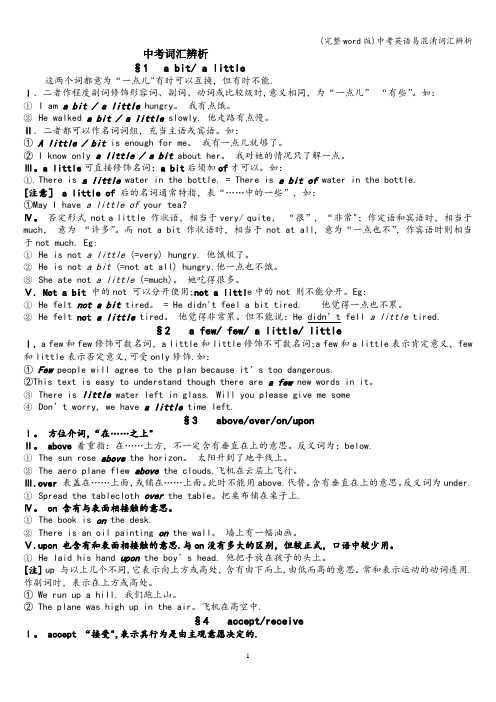
中考词汇辨析§1 a bit/ a little这两个词都意为“一点儿"有时可以互换,但有时不能.Ⅰ.二者作程度副词修饰形容词、副词、动词或比较级时,意义相同,为“一点儿”“有些”。
如:①I am a bit / a little hungry。
我有点饿。
②He walked a bit / a little slowly. 他走路有点慢。
Ⅱ.二者都可以作名词词组,充当主语或宾语。
如:①A little / bit is enough for me。
我有一点儿就够了。
② I know only a little / a bit about her。
我对她的情况只了解一点。
Ⅲ。
a little可直接修饰名词;a bit后须加of才可以。
如:①.There is a little water in the bottle. = There is a bit of water in the bottle.[注意] a little of后的名词通常特指,表“……中的一些”,如:①May I have a little of your tea?Ⅳ。
否定形式 not a little 作状语,相当于very/ quite,“很”, “非常";作定语和宾语时,相当于much,意为“许多”。
而not a bit 作状语时,相当于not at all, 意为“一点也不”,作宾语时则相当于not much. Eg:①He is not a little (=very) hungry. 他饿极了。
②He is not a bit (=not at all) hungry.他一点也不饿。
③She ate not a little (=much)。
她吃得很多。
Ⅴ. Not a bit中的not 可以分开使用;not a littl e中的not 则不能分开。
Eg:①He felt not a bit tired。
初中英语中考常用易错词汇辨析(共6组)

中考英语常用易错词汇辨析1.for / from / since(1)三者都能用来表示时间,但用法不同。
since “自从”,所表示的是一个时间点。
可用作介词,也可用作连词,后接时间名词或短语,或引导时间状语从句;要求前面的谓语动词或主句的谓语动词必须用完成时态,要用延续性动词。
而since引导的从句中的谓语动词通常应是短暂性的动词。
若接时间,则应为点时间。
如:① He has worked there since1989.他自从1989年就开始在那里工作了。
② She has lived here since she moved here.自从她搬过来就一直住这里了。
(2)from “自从”只用作介词,表一个事情的开始点,可用于过去、现在或将来的时态。
如:① They worked from 7:00 to 12:00 this morning.他们从今天早上7:00一直工作到12:00.② We have been good friends from childhood.我们从孩童时期就一直是好朋友。
(3)for 作为介词,后面接段时间,用于完成时、现在时、过去时和将来时,句中要用延续性动词。
如:① We’ll stay here for ten minutes.我们将在这儿呆10分钟。
② They have studied English for three yeas.他们已经学习英语三年了。
2.although/ though(1)although conj.“尽管、虽然”引导让步状语从句,相当于 though.只是比though稍微正式些。
多用于句首。
though 用于非正式文体中,较普遍,但以下几种用法,不能用although.如:①表强调时,要用even though,如:Even though I didn’t understand a word, I kept smiling.尽管我一字不识,我还是一直微笑着。
中考英语易错词辨析

中考英语易错词辨析一. Speak; talk; say; tell1.When Miss Green began to ___ something, the two boys stopped_____ and became quiet.2. ---- Are you enjoying the party?---- Sorry, I couldn’t hear what you _____. It’s too noisy here.3. The twins look the same. I can hardly____ the difference between them.4. ---- How to learn English well, Miss Green?---- First, try to____ English as much as possible.二. Forget; miss; lost; leave5. This morning, I went to work in such a hurry that. I ____ my key at home.6. Go along the street. The museum is just on your right. You can’t _____ it.三. Take a message; leave a message; give a message7.--- Hello, may I speak to Mr. White?--- Sorry, she is out right now. Can I a message?8. ---- Hello, may I speak to Mr. White?---- Sorry, she is our right now. Would you like to a message?四. Pay; spend; cost; take9. ---- How much did this CD ____ you, Sally?10. How long did it ____ you to finish this project?11. Kelly____ two hours doing her homework yesterday.五. Borrow; lend; keep12. ---- Bob, may I ____ your MP4?---- Sure, but you’d better not _____ it to others.六. Bring; take; fetch; carry13. Miss King has visited the art museum. I’m going to ____ her somewh ere else this afternoon?14. It’s getting colder. You’d better ____ this coat with you.七.Both…and…; as well as; not only…but also; neither…nor; either…or16. His hobby is ____ watching TV ____ playing the piano. It’s reading books.八.Arrive in; arrive at; reach; get to17. ----- When did your uncle Shanghai?----- The day before yesterday.九. Used to do; be used to doing; be used to do18. My grandfather us stories when I was young.十.Look at; look for; look up; look after; look at; look forward to; look over19. ---- Dear, what time is the flight to Beijing on Saturday?---- Wait a minute. Let me in the schedule.20. ---- Would you mind my little sister while I am away?---- Of course not.十一. Put on; dress sb/oneself; dress in; be dressed in; wear; in; try on; dress up21---- Do you like the new coat, Jack?--- Well, let me and see.22. Danny, It is raining outside. You’d better your raincoat.23. The small child was old enough to himself.24. Many girls would like to skirt in summer.A. put onB. wearC. dressD. in十二. Except; except for; besides25. ____ a bike, he got a lot of presents on his birthday.26. He did very well in his exam, _____ some spelling mistakes.27. My father is very busy. He works every day _____ Sunday.十三. Be made of ; be made from; be made in; be made up of; be made by28. A football team eleven players.29. This kind of watch gold so it is very expensive.30. This kind of wine rice and water.31. I got a big cake on my birthday and it my brother.32. This car is very expensive . is and it in Germany.十四. Another\other\others\the other\the others33.The little boy was very hungry and asked for __________ cake.34. I don’t like this coat, please show me __________.35. He always thinks of ___________ instead of himself.36. I have two friends. One is doctor and _________ is a teacher.37. There are many children in the room. Some are reading books, some are playing games, _____ arewatching TV.38. There’s enough room for____________ three people on the bus.39. Jim is taller than ________ students in his class.40. This English – Chinese dictionary is better than___________.十五. A little\a bit\ a bit of\ a few\ little\few41. Liu Mei has lived in England for two years and she knows ________ English now.43. There is ___________ water in the glass, so he can’t drink any.44. He felt _________ tired and went to bed after supper.45. Only __________ students can answer the question.46. The woman ate________ because the doctor said she was too fat.十六. Cross\across\through1.The girl helped the old man walk __________ the road.2. The children walked _________ the door one by one onto the bus.3. The car ran__________ the bridge and turned right into a park.4. A beautiful river runs ________ our town.5. He could swim_________ the river when he was young.6. When the sunshine went _________ the window into his bedroom, he finished writing his book in the end.7. Don’t ________ the busy street when the traffic light is red.8. She asked her little son not to _______ the river because it was raining hard.十七. Between\among1. Miss Li always stands_________ the students and teaches them how to learn English.2. We watched a football match _________ Japan and China yesterday.3. She is a girl with few words________ her classmates.4. I saw him standing __________ the people sang songs for them.5. The man has to fly __________ Guangzhou and Shanghai.6. There is a low wall __________ the two rooms.十八. At the end of \by the end\in the end1. _______________the match, he kicked another goal and won the game.2. With the help of his teachers, he caught up with his classmates ___________.3. We had learnt 1200 new English words _______________ last term.4. You can find the bookshop _____________ the street.5. The population of his town will reach 200 thousand __________________ 2015.十九. Too much\too many\much too1. Take care! There is __________ water on the floor.2. He was __________ tired to walk on.3. I’m ___________ busy t oday. I have __________ work to do.4. He ran__________ fast! I couldn’t catch up with him!5. Look! There’s ____________ sheep on the hill.6. The thief is __________stupid to steal the policeman’s car.二十. Noise\sound\voice 的用法区别1. “Don’t make so much__________.” He said to us in a low__________.2. The little girl has a beautiful__________.3. The ___________ of the machine is a ___________.4. The singer has lost her ringing _________ as a result of a bad cold.5. The _________ of the street kept me awake.6. Did you hear the strange __________ from the next room this morning? 二十一. Because\because of1. Everyone likes to make friends with her__________ her kindness.2. He gave up to buy the house __________ he didn’t have enough money.3. She was angry______ what he had done.4. They didn’t go out for a picnic _____________it was raining that da二十二. Maybe\ may be1. ________ you put the mobile phone in your bag.2. This pen isn’t mine. It ______ hers.3. ________ she can’4. He _______ Mike’s brother because they look like each other.5. My son _______ knows the news, so you can go and ask him.二十三. beat/win1.She had a nature that quickly her the friendship of her classmates.2.He soon a reputation for himself.3.I John at chess yesterday.4.We their team by 5∶4.1.He gets to school ______ bike.2.He is painting ______ a Chinese brush.3.I don't know how to say "Jiaozi" ______ Japanese.4.Maybe you can solve the problem ______ this way.5.I study Enlish _____ practicing speaking it every day.6.I usually write ______ a pen.7.We can look and see ____ our eyes.8.How did you send the letter, _______ airmail or _____ ordinary mail?9.He caught the ball ______ his left hand.10.She wrote the letter ______ a pencil.11.He came here _______ his car.12.He came here ______ car.13.Fill the glass ______ wine.14.The window was broken ______ that naughty boy.15. The old man sat there _____ a basket beside her.16.He fell asleep______the lamp burning.17. He sat there ______ his eyes closed.18.You must return _______ 10:00 pm.19.She has a house _______ a beautiful garden.20.Tom often goes to see Beijing Opera ______ his father on weekends.二十五. Join/join in/take part in1.---Would you like to ______ us in this topic?---Yes, I’d like.2.Every student wants to _______ the class meeting.3.My brother _______ the Army for 3 years.4.I’d like to invite you to ________ my birthday party.5.She will _______ an important meeting next month.6.All of us must _____ the activity which will be held next week by our school.。
中考常考易错词组辨析

中考常考易错词组辨析1. after,in这两个介词都可以表示“……(时间)以后”。
after 以过去为起点,表示过去一段时间之后,常用于过去时态的句子中。
例如:My sister went after three days.我姐姐是三天以后走的。
in 以现在为起点,表将来一段时间以后,常用于将来时态的句子中。
例如:My sister will go in three days.我姐姐将会三天后走。
2. few,a few,little,a littlefew 和little的意思是否定的,表示“很少”或“几乎没有”;而a few和a little的意思是肯定的,表示“有一些,有一点儿”。
few 和a few修饰可数名词;little 和a little 修饰不可数名词。
例如:There is little bread at home, could you buy some for me?家里几乎没有面包了,拟可以为我买一些吗?I have a few friends, we often play together.我有几个朋友,我们经常一起玩。
3. how long,how often,how soonhow long指多长时间,主要用来对一段时间(如three days,four weeks 等)提问。
例如:How long ago was it?这是多久前的事了?how often指多久一次,主要用来对频度状语(如once a week等)提问。
例如:—How often do you go to the cinama? 拟多久去看一次电影?—Once a month.每月一次。
how soon指多久以后,主要用来对表示将来的一段时间(in an week,in two months 等)提问。
例如:How soon will it last?它将持续多久?4. the other,anotherthe other 指两者中的“另一个”,表示特指,可接单数名词,也可单独使用。
中考易错知识点英语

中考易错知识点英语中考英语涵盖了词汇、语法、听力、阅读、写作等多个方面,其中一些知识点容易使学生产生困惑或错失分数。
以下是中考易错知识点英语的详细介绍。
一、词汇1.同义词和近义词的辨析:在选择题中,常常会涉及到同义词和近义词之间的辨析。
例如,选择"Which word has the same meaning as 'happy'?",选项可能包括"cheerful"、"excited"、"sad"、"angry"。
学生需要根据上下文的意思,正确选择同义词。
2.可数名词和不可数名词的区别:可数名词和不可数名词的区别容易让学生感到困惑。
例如,"Ibought some bread"是正确的,但是"I bought some rices"是错误的。
学生要注意区分名词的可数与不可数。
3.动词的形式:中考中常常考察动词的不同形式的使用。
例如,"He has gone to school"是正确的,但是"He has went to school"是错误的。
学生要掌握动词的各种形式。
二、语法1.时态的使用:时态是英语语法中的重要部分。
学生常常会触发以下错误:在一段描述过去的句子中使用现在时态,或者在描述将来的事件时使用现在完成时等。
学生需要在语境中正确选择时态。
2.主谓一致:主谓一致指主语和谓语动词在人称和数上保持一致。
例如,"She is a teacher"是正确的,但是"She is a teacher"是错误的。
学生要注意主谓一致的规则。
3.定冠词和不定冠词的使用:在英语中,定冠词和不定冠词的使用规则很多。
学生常常会触发以下错误:使用了不必要的冠词,或者没有使用需要的冠词。
- 1、下载文档前请自行甄别文档内容的完整性,平台不提供额外的编辑、内容补充、找答案等附加服务。
- 2、"仅部分预览"的文档,不可在线预览部分如存在完整性等问题,可反馈申请退款(可完整预览的文档不适用该条件!)。
- 3、如文档侵犯您的权益,请联系客服反馈,我们会尽快为您处理(人工客服工作时间:9:00-18:30)。
中考英语易错词辨析-----Prepared by Kenny一. Speak; talk; say; tell1.When Miss Green began to ___ something, the two boys stopped_____ and becamequiet.2. ---- Are you enjoying the party?---- Sorry, I couldn’t hear what you _____. It’s too noisy here.3. The twins look the same. I can hardly____ the difference between them.4. ---- How to learn English well, Miss Green?---- First, try to____ English as much as possible.二. Forget; miss; lost; leave5. This morning, I went to work in such a hurry that. I ____ my key at home.6. Go along the street. The museum is just on your right. You can’t _____ it.三. Take a message; leave a message; give a messageHello, may I speak to Mr. White?--- Sorry, she is out right now. Can I a message?8. ---- Hello, may I speak to Mr. White?---- Sorry, she is our right now. Would you like to a message?四. Pay; spend; cost; take9. ---- How much did this CD ____ you, Sally?10. How long did it ____ you to finish this project?11. Kelly____ two hours doing her homework yesterday.五. Borrow; lend; keep12. ---- Bob, may I ____ your MP4?---- Sure, but you’d better not _____ it to others.六. Bring; take; fetch; carry13. Miss King has visited the art museum. I’m going to ____ her somewhere else this afternoon?14. It’s getting colder. You’d better ____ this coat with you.七.Both…and…; as well as; not only…but also; neither…nor; either…or15. _____ Tom ____ Mary speaks good Chinese, so they can communicate with these Chinese students very well.16. H is hobby is ____ watching TV ____ playing the piano. It’s reading books.八.Arrive in; arrive at; reach; get to17. ----- When did your uncle Shanghai?----- The day before yesterday.九. Used to do; be used to doing; be used to do18. My grandfather us stories when I was young.十.Look at; look for; look up; look after; look at; look forward to; look over19. ---- Dear, what time is the flight to Beijing on Saturday?---- Wait a minute. Let me in the schedule.20. ---- Would you mind my little sister while I am away?---- Of course not.十一. Put on; dress sb/oneself; dress in; be dressed in; wear; in; try on; dress up21---- Do you like the new coat, Jack?--- Well, let me and see.22. Danny, It is raining outside. You’d better your raincoat.23. The small child was old enough to himself.24. Many girls would like to skirt in summer.A. put onB. wearC. dressD. in十二. Except; except for; besides25. ____ a bike, he got a lot of presents on his birthday.26. He did very well in his exam, _____ some spelling mistakes.27. My father is very busy. He works every day _____ Sunday.十三. Be made of ; be made from; be made in; be made up of; be made by28. A football team eleven players.29. This kind of watch gold so it is very expensive.30. This kind of wine rice and water.31. I got a big cake on my birthday and it my brother.32. This car is very expensive . is and it in Germany.十四. Another\other\others\the other\the otherslittle boy was very hungry and asked for __________ cake.34. I don’t like this coat, please show me __________.35. He always thinks of ___________ instead of himself.36. I have two friends. One is doctor and _________ is a teacher.37. There are many children in the room. Some are reading books, some are playinggames, _____ are watching TV.38. There’s enough room for____________ three people on the bus.39. Jim is taller than ________ students in his class.40. This English – Chinese dictionary is better than___________.十五. A little\a bit\ a bit of\ a few\ little\few41. Liu Mei has lived in England for two years and she knows ________ English now.42. The boy is a new comer here, so he has ________ friends here.43. There is ___________ water in the glass, so he can’t drink any.44. He felt _________ tired and went to bed after supper.45. Only __________ students can answer the question.46. The woman ate________ because the doctor said she was too fat.十六. Cross\across\throughgirl helped the old man walk __________ the road.2. The children walked _________ the door one by one onto the bus.3. The car ran__________ the bridge and turned right into a park.4. A beautiful river runs ________ our town.5. He could swim_________ the river when he was young.6. When the sunshine went _________ the window into his bedroom, he finished writinghis book in the end.7. Don’t ________ the busy street when the traffic light is red.8. She asked her little son not to _______ the river because it was raining hard.十七. Between\among1. Miss Li always stands_________ the students and teaches them how to learn English.2. We watched a football match _________ Japan and China yesterday.3. She is a girl with few words________ her classmates.4. I saw him standing __________ the people sang songs for them.5. The man has to fly __________ Guangzhou and Shanghai.6. There is a low wall __________ the two rooms.十八. At the end of \by the end\in the end1. _______________the match, he kicked another goal and won the game.2. With the help of his teachers, he caught up with his classmates ___________.3. We had learnt 1200 new English words _______________ last term.4. You can find the bookshop _____________ the street.5. The population of his town will reach 200 thousand __________________ 2015.十九. Too much\too many\much too1. Take care! There is __________ water on the floor.2. He was __________ tired to walk on.3. I’m ___________ busy today. I have __________ work to do.4. He ran__________ fast! I couldn’t catch up with him!5. Look! There’s ____________ sheep on the hill.6. The thief is __________stupid to steal the policeman’s car.二十. Noise\sound\voice 的用法区别1. “Don’t make so much__________.” He said to us in a low__________.2. The little girl has a beautiful__________.3. The ___________ of the machine is a ___________.4. The singer has lost her ringing _________ as a result of a bad cold.5. The _________ of the street kept me awake.6. Did you hear the strange __________ from the next room this morning?二十一. Because\because of1. Everyone likes to make friends with her__________ her kindness.2. He gave up to buy the house __________ he didn’t have enough money.3. She was angry______ what he had done.4. They didn’t go out for a picnic _____________it was raining that da 二十二. Maybe\ may be1. ________ you put the mobile phone in your bag.2. This pen isn’t mine. It ______ hers.3. ________ she can’t come because of the bad weather.4. He _______ Mike’s brother because they look like each other.5. My son _______ knows the news, so you can go and ask him.二十三. beat/winhad a nature that quickly her the friendship of her classmates. soon a reputation for himself.John at chess yesterday.their team by 5∶4.was badly in the election.二十四.by/with/ingets to school ______ bike.is painting ______ a Chinese brush.don't know how to say "Jiaozi" ______ Japanese.you can solve the problem ______ this way.study Enlish _____ practicing speaking it every day.usually write ______ a pen.can look and see ____ our eyes.did you send the letter, _______ airmail or _____ ordinary mail?caught the ball ______ his left hand.wrote the letter ______ a pencil.came here _______ his car.came here ______ car.the glass ______ wine.window was broken ______ that naughty boy.15. The old man sat there _____ a basket beside her.fell asleep______the lamp burning.17. He sat there ______ his eyes closed.must return _______ 10:00 pm.has a house _______ a beautiful garden.often goes to see Beijing Opera ______ his father on weekends.二十五. Join/join in/take part inyou like to ______ us in this topic?---Yes, I’d like.student wants to _______ the class meeting.brother _______ the Army for 3 years.’d like to invite you to ________ my birthday party.will _______ an important meeting next month.of us must _____ the activity which will be held next week by our school.。
